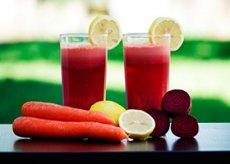Medical expert of the article
New publications
Beet juice in pregnancy
Last reviewed: 04.07.2025

All iLive content is medically reviewed or fact checked to ensure as much factual accuracy as possible.
We have strict sourcing guidelines and only link to reputable media sites, academic research institutions and, whenever possible, medically peer reviewed studies. Note that the numbers in parentheses ([1], [2], etc.) are clickable links to these studies.
If you feel that any of our content is inaccurate, out-of-date, or otherwise questionable, please select it and press Ctrl + Enter.

If you still think that boiled beets and beet juice during pregnancy only help with constipation, which most expectant mothers complain about, then you don’t know the main thing about this vegetable.
How to properly prepare and consume beetroot juice during pregnancy?
In order for beetroot juice to become a healthy product, it must be prepared correctly. It is recommended to soak raw beets in cold water (about 20-30 minutes), peel them with a stainless steel knife, cut them into pieces and put them in a juicer. The juice should be poured into a glass or enamel container.
But you can't drink beet juice right after you get it! You should definitely give it time to get rid of substances that are harmful to the body. To do this, put the juice in the refrigerator for 3-3.5 hours, and so that everything unnecessary evaporates, the container with the juice should remain open.
If we talk about the rules for drinking beet juice, then you can’t drink it in its pure form, but only after diluting it with water - in a ratio of 1:1. You can drink no more than 120-130 ml of diluted juice per day, but not once, but three times during the day.
Judging by the reviews of beetroot juice during pregnancy left by women who have tried it, the taste of the drink leaves much to be desired. And there is advice to drink beetroot-carrot juice during pregnancy. Firstly, it tastes better, and secondly, carrots are also very useful, especially for vision.
A slice of fresh lemon with the peel will also help enhance the taste of beetroot juice.
Benefits of Beetroot Juice During Pregnancy
What does beetroot contain and, in particular, what benefits can beetroot juice have during pregnancy?
So, beetroot contains carbohydrates in the form of natural digestible sugars; a rich set of vitamins - carotene, ascorbic acid (C), thiamine (B1), riboflavin (B2), niacin (B3), pantothenic acid (B5), pyridoxine (B6), folic acid (B9); macro- and microelements - potassium, magnesium, phosphorus, calcium, sodium, manganese, iron, copper, cobalt, zinc, iodine. It contains malic, citric and tartaric organic acids, as well as betaine, betacyanin, etc.
Beetroot juice is beneficial for pregnant women because it:
- Reduces the risk of developing iron deficiency anemia due to the content of iron and vitamin C, which improves the absorption of iron.
- Reduces the risk of premature termination of pregnancy, which can be caused by a lack of vitamin C in the body.
- Helps stabilize blood glucose levels, as beets have a low glycemic index.
- Thanks to vitamin B9 (folic acid), it prevents intrauterine defects of the fetus in the first three months of pregnancy (neural tube defects), since the need for folates, necessary for DNA synthesis in cells, doubles during pregnancy.
- Replenishes the mother's iodine reserves, since its deficiency can lead to miscarriage or the development of mental retardation in the child.
- Ensures normal functioning of the stomach and pancreas, including due to the content of vitamin B3.
- Protects the liver from fatty degeneration of cells thanks to oleanolic acid and betaine, which activates the synthesis of phospholipids necessary to restore the integrity of hepatocyte membranes. In addition, betaine acts as a powerful anti-inflammatory agent and prevents joint pain and swelling.
- Reduces the level of the highly toxic metabolite homocysteine, an increase in the level of which threatens miscarriage, as well as late gestosis and fetal asphyxia, and in the mother causes damage to blood vessels and the formation of blood clots in them.
- Cleanses the liver and blood of toxins due to the antioxidant pigment betacyanin.
- Reduces cramps in the calf muscles and foot muscles associated with calcium deficiency; prevents osteoporosis. The absorption of calcium is facilitated by the amino acids in beets and beet juice, in particular lysine.
- Improves blood circulation and helps lower blood pressure (due to the formation of nitric oxide in the intestines from nitrates present in root vegetables).
Contraindications and side effects of drinking beetroot juice
Pregnant women are contraindicated to drink beetroot juice if they have kidney problems (including oxalate stones), high blood cholesterol, excessive weight gain and a tendency to obesity, and high levels of acid in the gastric juice.
Side effects attributed exclusively to betaine include nausea, vomiting, diarrhea, dizziness, attacks of weakness, and stomach problems. Also, betaine - with an "overdose" of beet juice - can provoke an increase in the overall cholesterol level.
Nutritionists almost universally recommend including a certain amount of beets in the daily menu of pregnant women, but there are no standard recommendations regarding the consumption of raw beet juice.
But, given that beets are an excellent natural source of folic acid, beetroot juice during pregnancy - if the rules for its preparation and consumption are followed - is a good option for pregnant women.


 [
[